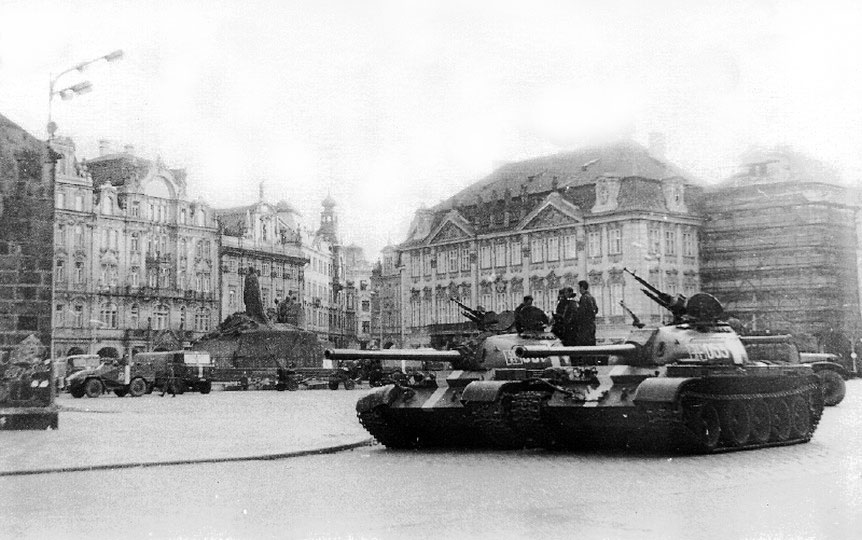On the night of 20 upon 21 August 1968, tanks rolled into Czechoslovakia. A coalition of troops under the leadership of the Soviet Union invaded the country under the pretence of 'fraternal assistance'. In reality, the intervention had the objective to put an end to the Prague Spring and to regain the control over the Czechoslovak society.
Year 1968 for many European countries constituted a turning point marked by ideological and political unrest. This was also the case for Czechoslovakia, where its newly-elected general secretary Alexander Dubček introduced the 'Action Plan', initiating a period of political liberalisation (later to be known as the Prague Spring). His reformist policies focused on the construction of 'socialism with a human face', leading to the allocation of more freedoms and fuelling a more critical public debate.
The other Warsaw Pact member states1 observed these developments with great anxiety. The leaders of Poland, the German Democratic Republic and Bulgaria expressed their concerns about the 'counterrevolutionary forces' in the Czechoslovak society which – as they insisted – wanted to take the socialist party down and would spill over to the rest of the socialist bloc. The internal Czechoslovak affairs were regarded by them as a threat for the whole socialist bloc; active intervention was therefore perceived as justified. Representatives of the Soviet Union and Hungary had a somewhat more moderate stance and were reluctant towards a military operation. They focused more on finding a political solution to reverse the developments in Czechoslovakia. Romania, isolated within the Warsaw Pact due to its independent foreign policy, was the only country whose leader Nicolae Ceaușescu kept supporting Dubček, seeing him as a potential ally within the Warsaw Pact.
In the months leading up to the invasion, Dubček was put under more and more pressure from all sides. While the Czechoslovak people wanted to take the reforms even further, the socialist party of Czechoslovakia became increasingly divided over Dubček's reforms. Moreover, the Warsaw Five (the Warsaw Pact countries with the exception of Romania, Czechoslovakia, and Albania) repeatedly urged Dubček to take back control over the Czechoslovak society.
The situation changed drastically in the beginning of August 1968, after a conference between the Warsaw Five and Czechoslovakia was held in Bratislava. The hardliners within the Czechoslovak socialist party under the leadership of Vasil Biľak seized this opportunity to give a secret letter to the representatives of the Soviet Union. They expressed a conviction that only an external 'fraternal assistance' – in other words military intervention – could safeguard socialism in Czechoslovakia and in the rest of the bloc.
On the night of 20 upon 21 August 1968, 170 000 Soviet troops together with combat units from Poland, Bulgaria and Hungary and a liaison unit from the GDR marched into Czechoslovakia2. The Czechoslovak socialist party had been forewarned right before the invasion. The army was instructed not to resist the incoming troops and Dubček called on the Czechoslovak people to follow the same line. Although no violent resistance occurred, the invasion was met with protest; strikes, petitions, posters, graffiti and mass demonstrations revealed the societal dissatisfaction. The lack of violent resistance did not however prevent casualties. More than 70 Czechoslovak people were killed and hundreds were injured.
While the society opposed the invasion, Dubček was brought to Moscow for negotiations. Soon it became evident that his immediate removal was not an option, as the hardliners within the Czechoslovak party failed to win enough support for such a plan. Ultimately, the negotiations led to the signing of the 'Moscow Protocol' – the first step towards the so-called 'normalization' during which all Prague Spring reforms (except for one3) were reversed and the socialist party regained full control over society. The following year, the reformists within the socialist party were dismissed and eventually, Gustáv Husák took over Dubček's position. The resistance within the Czechoslovak society died out quickly after the military intervention and an apolitical attitude was adopted instead.
On the international level, the relations between Czechoslovakia and the Warsaw Five became heavily disrupted. Moreover, in response to the intervention the Albanian leaders decided to officially withdraw its membership from the Warsaw Pact. In addition, the Brezhnev Doctrine was introduced, which retrospectively justified the invasion of 1968. It approved intervention if forces, both in- and external, threatened socialism. This would be the Soviet foreign policy until the 1980s.
by Jolinke Golbach
Bibliography
Anthony Kemp-Welch, "Eastern Europe: Stalinism to Solidarity", in Melvyn P. Leffler & Odd Arne Westad (eds.), The Cambridge History of the Cold War: Volume II Crisis and Détente, Cambridge University Press, 2010.
Laura Cashman, "Remembering 1948 and 1968: Reflections on Two Pivotal Years in Czech and Slovak History", Europe-Asia Studies, vol. 60, no. 10, 2008, p.1645–1658.
Laurien Crump, The Warsaw Pact Reconsidered: International Relations in Eastern Europe, 1955-1969, Routledge, 2015.
Mark Kramer, "The Prague Spring and the Soviet Invasion in Historical Perspective", in Günter Bischof, Stefan Karner & Peter Ruggenthaler (eds.), The Prague Spring and the Warsaw Pact Invasion of Czechoslovakia in 1968, Lexington Books, 2010.
ENDNOTES
1 The Warsaw Pact was established in 1955 as the counterpart of the North Atlantic Treaty Organisation. Member states included Albania (until 1968), Bulgaria, Czechoslovakia, the German Democratic Republic, Hungary, Poland, Romania and the Soviet Union. Albania withheld its support for the Pact in 1961 and was therefore excluded ever since. The Pact was dissolved in 1991.
2 Despite the Soviet leadership over the invasion and their big contribution to the troops, the invasion was not exclusively Soviet. Bulgaria, the German Democratic Republic, Hungary and Poland also contributed to the operation. However, it was not an official Warsaw Pact invasion, since Romania and Czechoslovakia did not agree nor contribute to the invasion.
3 Czechoslovakia was federalized into two equal republics; the Czech and the Slovak Republic. The policy was the only change of the Prague Spring that survived during the normalization.
